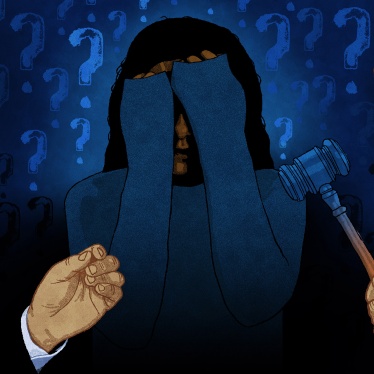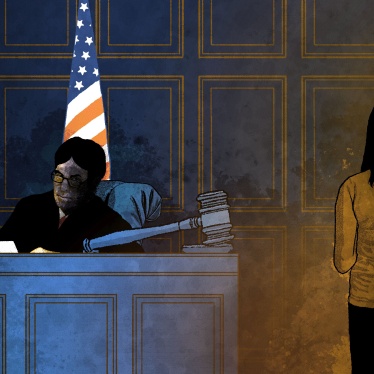By Michael Bochenek, Counsel to the Children's Rights Division of Human Rights Watch
Serious juvenile crime in California has fallen an astonishing 30 percent in the past decade. But that fact is barely acknowledged in Proposition 21, the juvenile crime initiative on the March 7 ballot. The proposition would expand the number of children tried as adults in order to combat what it calls the "larger and more ominous threat" of crime by youth.
This "threat" is rhetorical smoke and mirrors. Proposition 21 is an objectionable, unnecessary measure that deserves to be defeated.
One of Proposition 21's harshest aspects is its provision requiring an adult prison term for anyone sixteen years of age or older who is convicted in adult court. Adult facilities are not equipped to address the needs of youth. They often lack adequate education, medical services, or mental health care. In some cases they pose serious threats to the personal safety of young detainees.
Human Rights Watch's research has documented these risks in investigations around the country. Last year I spoke with seventeen-year-old Joey N. at the Baltimore City Detention Center, where he had spent more than six months. He reported that the adult detainees continually harassed him by throwing excrement and urine in his cell.
In desperation, he resorted to telling the guards that he was suicidal, and they moved him to the psychiatric wing for several days. When Joey returned to the section, he asked the guards to place him in an isolation cell. Heavy metal sheets completely covered the bars, preventing other detainees from throwing feces into the cell but also blocking all natural light.
There is no evidence that treating children as adults reduces crime. A study comparing Connecticut, which had the highest juvenile-to-adult transfer rate in the United States, with Colorado, the state with the lowest rate of such transfers, found that the youth crime rate was the same in each state. Similarly, studies of violent juvenile crime in Idaho, Florida, and New York have found that making it easier to try youth as adults does not deter violent juvenile crime.
In fact, California already has the option of transferring the most serious offenders to adult court. Transfers now take place in court, in front of a judge, with the opportunity for a fair hearing. Proposition 21 would make such transfers mandatory in some cases and give prosecutors the final word in many others.
Giving prosecutors unfettered discretion over who is charged as an adult is particularly unwise. Without clear standards or judicial oversight, prosecutors' decisions will vary from county to county—creating "justice by geography," in the words of legal scholar Barry Feld.
These overly broad powers can easily lead to other abuses of discretion, particularly when prosecutors charge youth of color. In Minneapolis and its suburbs, for example, only 28 percent of youth charged as adults are white—even though white youth make up 55 percent of violent youthful offenders. Minority youth constitute less than one-fifth of the area's population but 72 percent of all youth charged as adults.
Even with the procedural safeguards of the current judicial transfer system, minority youth in California are significantly more likely to be sent to adult courts than their white counterparts. A study released this month by the Justice Policy Institute found that compared with white youth, children of color are 2.8 times more likely to be charged with violent crimes, 6.2 times more likely to be tried in adult court, and 7 times more likely to be sentenced to prison when they are tried as adults. These stark disparities suggest that Proposition 21 will hit minority youth the hardest, resulting in even greater numbers of children of color behind bars in adult prisons.
Sending children to adult courts and locking them up with hardened offenders will not reduce crime. Nor will it help these youth become productive members of society. As James S., a seventeen-year-old held in Rockville, Maryland, said to me, "Being here with adults, that ain't going to rehabilitate me, it's just teaching me to be a better criminal."







